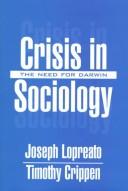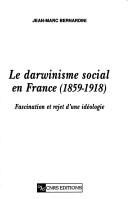| Listing 1 - 10 of 882 | << page >> |
Sort by
|

ISBN: 135132019X 1351320203 1351320181 9781351320184 9781138521551 9780765808745 1560003987 9781560003984 Year: 2017 Publisher: Abingdon, Oxon
Abstract | Keywords | Export | Availability | Bookmark
 Loading...
Loading...Choose an application
- Reference Manager
- EndNote
- RefWorks (Direct export to RefWorks)
"Crisis in Sociology presents a compelling portrait of sociology's current troubles and proposes a controversial remedy. In the authors' view, sociology's crisis has deep roots, traceable to the over-ambitious sweep of the discipline's founders. Generations of sociologists have failed to focus effectively on the tasks necessary to build a social science. The authors see sociology's most disabling flaw in the failure to discover even a single general law or principle. This makes it impossible to systematically organize empirical observations, guide inquiry by suggesting falsifiable hypotheses, or form the core of a genuinely cumulative body of knowledge. Absent such a theoretical tool, sociology can aspire to little more than an amorphous mass of hunches and disconnected facts. The condition engenders confusion and unproductive debate. It invites fragmentation and predation by applied social disciplines, such as business administration, criminal justice, social work, and urban studies. Even more dangerous are incursions by prestigious social sciences and by branches of evolutionary biology that constitute the frontier of the current revolution in behavioral science. Lopreato and Crippen argue that unless sociology takes into account central developments in evolutionary science, it will not survive as an academic discipline. Crisis in Sociology argues that participation in the "new social science," exemplified by thriving new fields such as evolutionary psychology, will help to build a vigorous, scientific sociology. The authors analyze research on such subjects as sex roles, social stratification, and ethnic conflict, showing how otherwise disconnected features of the sociological landscape can in fact contribute to a theoretically coherent and cumulative body of knowledge."--Provided by publisher.
Sociology --- Social Darwinism. --- Research.
Book
ISBN: 149820063X 9781498200639 1498200621 9781498200622 Year: 2016 Publisher: Eugene, Oregon
Abstract | Keywords | Export | Availability | Bookmark
 Loading...
Loading...Choose an application
- Reference Manager
- EndNote
- RefWorks (Direct export to RefWorks)
John Hall Snow was professor of pastoral theology at the Episcopal Divinity School and considered preacher-in-residence at Christ Church, Cambridge, Massachusetts, for over eighteen years. In this previously unpublished manuscript, Snow outlines his critique of American culture building on America's adoption of Herbert Spencer's social theory known as ""survival of the fittest."" The unconscious acceptance of his theory has reduced us to ""winners"" and ""losers,"" leading us to disfigure language and truth. Snow writes, ""We lie to others, and ourselves, basically, because we believe that lie
Social Darwinism. --- Darwinism, Social --- Competition --- Social change --- Social conflict --- Social evolution
Book
ISBN: 1282948792 9786612948794 9004190139 9789004190139 9789004185036 9004185038 Year: 2010 Publisher: Leiden Boston Brill
Abstract | Keywords | Export | Availability | Bookmark
 Loading...
Loading...Choose an application
- Reference Manager
- EndNote
- RefWorks (Direct export to RefWorks)
The book deals with the influences Social Darwinism exerted upon Korea’s modern ideologies in their formative period - especially nationalism – after its introduction to Korea in 1883 and before Korea’s annexation by Japan in 1910. It shows that the belief in the “survival of the fittest” as the overarching cosmic and social principle constituted the main underpinning for the modernity discourses in Korea in the 1890's-1900's. Unlike the dominant ideology of traditional Korea, Neo-Confucianism, which was largely promoted by the scholar-official elite, Social Darwinism appealed to the modern intellectuals, but also to the entrepreneurs, providing the justification for their profit-seeking activities as part of the “national survival” project. As an ideology of Korea’s nascent capitalism, Social Darwinism in Korea could, however, hardly be called a liberal creed: it clearly prioritized “national survival” over individual rights and interests.
Social Darwinism --- Nationalism --- History. --- Korea --- Social policy. --- History
Book
ISBN: 1845406451 9781845406455 9781845401566 Year: 2015 Publisher: Exeter, UK Andrews UK
Abstract | Keywords | Export | Availability | Bookmark
 Loading...
Loading...Choose an application
- Reference Manager
- EndNote
- RefWorks (Direct export to RefWorks)
Conservatism. --- Social Darwinism. --- Evolution (Biology) --- Social aspects. --- Darwin, Charles, --- Influence.
Book
Abstract | Keywords | Export | Availability | Bookmark
 Loading...
Loading...Choose an application
- Reference Manager
- EndNote
- RefWorks (Direct export to RefWorks)
"In this book, Noah Horwitz argues that the age of Darwinism is ending. Building on the ontological insights of his first book Reality in the Name of God in order to intervene into the intelligent design versus evolution debate, Horwitz argues in favor of intelligent design by attempting to demonstrate the essentially computational nature of reality. In doing so, Horwitz draws on the work of many of today's key computational theorists (e.g., Wolfram, Chaitin, Friedkin, Lloyd, Schmidhuber, etc.) and articulates and defends a computational definition of life, and in the process lays out key criticisms of Darwinism. He does so in part by incorporating the insights of the Lamarckian theories of Lynn Margulis and Maximo Sandin. The possible criticisms of a computationalist view from both a developmental perspective (e.g., Lewontin, Jablonka, West-Eberhard, etc.) and chaos theory (e.g., Brian Goodwin) are addressed. In doing so, Horwitz engages critically with the work of intelligent design theorists like William Dembksi. At the same time, he attempts to define the nature of the Speculative Realist turn in contemporary Continental Philosophy and articulates criticisms of leading figures and movements associated with it, such as Object-Oriented Ontology, Quentin Meillassoux, and Ray Brassier. Ultimately, Horwitz attempts to show that rather than heading towards heat death, existence itself will find its own apotheosis at the Omega Point. However, that final glorification is only possible given that all of reality is compressible into the divine name itself"--https://punctumbooks.com/titles/divine-name-verification/, accessed 06/04/2020.
Theology, Practical. --- continental philosophy --- intelligent design --- cubernetics --- Darwinism --- biology

ISBN: 2271054834 2271078474 9782271054838 Year: 1997 Publisher: Paris : C.N.R.S.-Editions (Centre National de la Recherche Scientifique),
Abstract | Keywords | Export | Availability | Bookmark
 Loading...
Loading...Choose an application
- Reference Manager
- EndNote
- RefWorks (Direct export to RefWorks)
truggle for existence, survival of the fittest ... It has long been believed that the use for political and social purposes of the theories of Charles Darwin was a specialty of the Anglo-Saxon countries only. Contrary to this generally accepted idea, the author maintains that a real Darwinian culture developed in France in the last century, far beyond the inner circle of scientists, and often against their will. For the attention to mediators of a scientific culture, this book shows how in his philosophical debates, religious and political, the France of the long nineteenth ecentury first expressed its fascination and then its reluctance for the new evolutionary ideas of Charles Darwin. The in-depth study of the phenomena of circulation, rooting or rejection of a scientific ideology ultimately sheds a singular light on the resistance of French scientists to Darwinian theories, resistance which made them fall far behind in the field of evolutionary biology.
Social Darwinism --- -Darwinism, Social --- -Social Darwinism --- Darwinism, Social --- Competition --- Social change --- Social conflict --- Social evolution --- Darwinisme social --- France --- History --- 18th-19th centuries --- Darwinism. --- Ideology. --- Knowledge, Theory of --- Philosophy --- Political science --- Psychology --- Thought and thinking --- Social Darwinism - France --- darwinisme social --- racisme --- Troisième République --- eugénisme

ISBN: 1282298275 9786612298271 1400827337 9781400827336 9780691136394 0691136394 9781282298279 6612298278 Year: 2008 Publisher: Princeton, NJ
Abstract | Keywords | Export | Availability | Bookmark
 Loading...
Loading...Choose an application
- Reference Manager
- EndNote
- RefWorks (Direct export to RefWorks)
Jesus and Darwin do battle on car bumpers across America. Medallions of fish symbolizing Jesus are answered by ones of amphibians stamped "Darwin," and stickers proclaiming "Jesus Loves You" are countered by "Darwin Loves You." The bumper sticker debate might be trivial and the pronouncement that "Darwin Loves You" may seem merely ironic, but George Levine insists that the message contains an unintended truth. In fact, he argues, we can read it straight. Darwin, Levine shows, saw a world from which his theory had banished transcendence as still lovable and enchanted, and we can see it like that too--if we look at his writings and life in a new way. Although Darwin could find sublimity even in ants or worms, the word "Darwinian" has largely been taken to signify a disenchanted world driven by chance and heartless competition. Countering the pervasive view that the facts of Darwin's world must lead to a disenchanting vision of it, Levine shows that Darwin's ideas and the language of his books offer an alternative form of enchantment, a world rich with meaning and value, and more wonderful and beautiful than ever before. Without minimizing or sentimentalizing the harsh qualities of life governed by natural selection, and without deifying Darwin, Levine makes a moving case for an enchanted secularism--a commitment to the value of the natural world and the human striving to understand it.
Natural selection. --- Civilization, Secular. --- Social Darwinism. --- Darwinism, Social --- Competition --- Social change --- Social conflict --- Social evolution --- Secularism --- Darwinism --- Selection, Natural --- Genetics --- Variation (Biology) --- Biological invasions --- Evolution (Biology) --- Heredity --- Darwin, Charles, --- Darwin, Charles, Robert --- Influence. --- Secular civilization
Book
ISBN: 9780511804755 9780521768931 9780521745956 9781139041959 1139041959 051180475X 0521768934 0521745950 113903572X 1107209315 1283053861 9786613053862 1139041185 1139044583 1139038044 1139040405 9781107209312 9781283053860 6613053864 9781139041188 9781139044585 9781139038041 9781139040402 Year: 2010 Publisher: Cambridge, UK New York Cambridge University Press
Abstract | Keywords | Export | Availability | Bookmark
 Loading...
Loading...Choose an application
- Reference Manager
- EndNote
- RefWorks (Direct export to RefWorks)
Social scientists can learn a lot from evolutionary biology - from systematics and principles of evolutionary ecology to theories of social interaction including competition, conflict and cooperation, as well as niche construction, complexity, eco-evo-devo, and the role of the individual in evolutionary processes. Darwinian sociocultural evolutionary theory applies the logic of Darwinism to social-learning based cultural and social change. With a multidisciplinary approach for graduate biologists, philosophers, sociologists, anthropologists, social psychologists, archaeologists, linguists, economists, political scientists and science and technology specialists, the author presents this model of evolution drawing on a number of sophisticated aspects of biological evolutionary theory. The approach brings together a broad and inclusive theoretical framework for understanding the social sciences which addresses many of the dilemmas at their forefront - the relationship between history and necessity, conflict and cooperation, the ideal and the material and the problems of agency, subjectivity and the nature of social structure.
Social Darwinism. --- Evolution (Biology) --- Animal evolution --- Animals --- Biological evolution --- Darwinism --- Evolutionary biology --- Evolutionary science --- Origin of species --- Biology --- Evolution --- Biological fitness --- Homoplasy --- Natural selection --- Phylogeny --- Darwinism, Social --- Competition --- Social change --- Social conflict --- Social evolution --- Life Sciences --- General and Others
Book
ISBN: 1469610132 9781469610139 9798890874863 9780807896976 0807896977 Year: 1981 Publisher: Chapel Hill The University of North Carolina Press
Abstract | Keywords | Export | Availability | Bookmark
 Loading...
Loading...Choose an application
- Reference Manager
- EndNote
- RefWorks (Direct export to RefWorks)
In Germany, more than anywhere else, Darwinism was a sensational success. Setting his analysis against the background of popular science, Kelly follows popular Darwinism as it permeated education, religion, politics, and social thought in Germany. He explains how the popularizers changed Darwin's thought in subtle ways and how these changes colored their perceptions of Darwinism. Among the first purveyors of mass culture, the Germans provide valuable clues as to how seminal ideas move through a society. Originally published in 1981.
Philosophy, German --- Social Darwinism --- Darwinism, Social --- Competition --- Social change --- Social conflict --- Social evolution --- History. --- Darwin, Charles, --- Darwin, Charles, Robert --- Germany --- Intellectual life
Book
ISBN: 0511693109 1108001548 Year: 1871 Publisher: Place of publication not identified : Cambridge : publisher not identified, Cambridge University Press
Abstract | Keywords | Export | Availability | Bookmark
 Loading...
Loading...Choose an application
- Reference Manager
- EndNote
- RefWorks (Direct export to RefWorks)
Alfred Russel Wallace (1823-1913) is regarded as the co-discoverer with Darwin of the theory of evolution. It was an essay which Wallace sent in 1858 to Darwin (to whom he had dedicated his most famous book, The Malay Archipelago) which impelled Darwin to publish an article on his own long-pondered theory simultaneously with that of Wallace. As a travelling naturalist and collector in the Far East and South America, Wallace already inclined towards the Lamarckian theory of transmutation of species, and his own researches convinced him of the reality of evolution. On the publication of On the Origin of Species, Wallace became one of its most prominent advocates. This second, corrected, edition (1871) of a series of essays published in book form in 1870, shows the development of his thinking about evolution, and emphasises his admiration for, and support of, Darwin's work.
Natural selection. --- Darwinism --- Selection, Natural --- Genetics --- Variation (Biology) --- Biological invasions --- Evolution (Biology) --- Heredity
| Listing 1 - 10 of 882 | << page >> |
Sort by
|

 Search
Search Feedback
Feedback About UniCat
About UniCat  Help
Help News
News